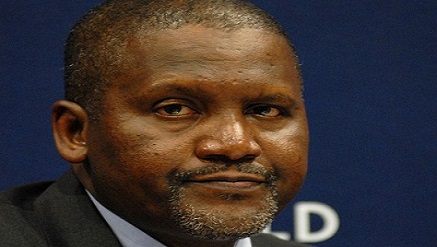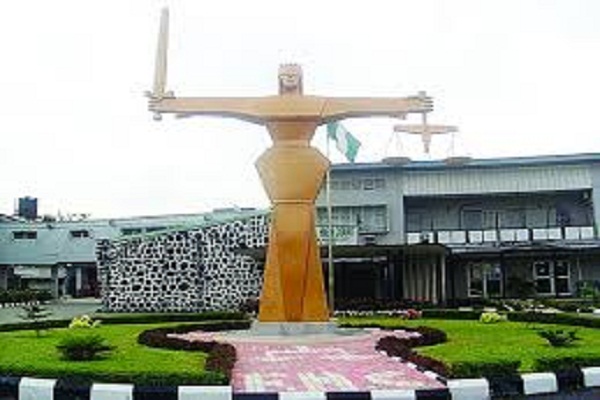News
Johnson Commends NiRA, Registrars on .ng Domain Name Impacts

Dr Omobola Johnson, minister of Communication Technology has commended the Nigeria Internet Registration Association (NiRA) and the Registrars for their resolves to exploit the uniqueness of the .ng domain name in projecting the international relevance of Nigeria’s Country Code Top Level Domain (ccTLD).
Johnson made the remark while commissioning NiRA office complex at 8 Funsho Willaims Avenue, Iponri, Suru-Lere, Lagos, on Friday.
The Minister also encouraged the accredited Registrars to double their efforts to serving the internet community locally and register .ng domain name on behalf of the Registrants worldwide and become big players like the “GoDaddy” of USA.
She identified .ng domain name as the country’s unique identity in the cyberspace.
“It is ours and our internet economy grows in leaps and bounds, we must proudly secure our identity in cyberspace. I therefore assure Nigerians that we are in for eccit.i.ng times”.
She recalled that the NiRA House commissioned on Friday, was purchased from the proceeds of past sales of premium domain names, validating the fact that the business and wealth creation opportunities in the domain name registration industry are significant.
The property serves, mot only as the operational headquarters of NiRA, but also provides a resource centre for training and certification in Domain Name System (DNS), an e-library for research in DNS, fully furnished offices for short term hiring, and a canteen.
“I am fully assured that the Executive Board of Directors will ensure sustainable good use of the premises,” Johnson said, while acknowledging the contributions of the Ministry, the Nigerian Communications Commission (NCC) and the National Information Technology Development Agency (NITDA), and other stakeholders in keeping NiRA’s dreams alive.
On her part, Mrs. Mary Nma Uduma, president of NiRA said, “For us at NIRA it’s a dream come true, looking back from our humble beginning, when we started from nothing, our sustainance then was out of the goodwill of our stakeholders, people of like interests/mind in the DNS industry as well as some members of the Association.
“NiRA’s office was a single room in a residential apartment in SuruLere, Lagos before NITDA gave us an office space at Kofo Abayomi Street, Victoria Island, Lagos.
“The success of NIRA cannot be complete, without appreciating our supervising Government Agencies; Ministry of Communication Technology (COMTECH), National Information Technology Development Agency (NITDA), our stakeholders such Nigerian Communications Commission (NCC), Nigeria Computer Society (NCS), Internet Service Providers Association of Nigeria (ISPAN), Computer Professionals Registration Council of Nigeria (CPN), Internet eXchange Point of Nigeria (IXPN), Institute of Software Practitioners of Nigeria (ISPON) and other ICT stakeholders.
“I would also seize this moment to appreciate and thank our Board of Trustees, my colleagues on the Executive Board of Directors, staff of NiRA, our Accredited Registrars, Registrants, members of the Association and the public for their immense contributions.
“My joy is that history will not forget us because victory is ours and all achievements of NiRA are for the development of our nation Nigeria”.
NiRA was founded on March 23, 2005 as a stakeholder-led organisation, charged with the management of the Nigeria’s country code Top Level Domain Name (ccTLD), dot ng.
The transfer of the appropriate management of this important National Resource was coordinated by the National Information Technology Development Agency (NITDA) on behalf of the Federal government of Nigeria. Stakeholders within Nigeria’s Internet community participated in its formation. It was registered as an Incorporated Trustee on February 9, 2007.
NIRA’s formation brought to an end the long years of controversy in the country, over the management of this critical national resource, following the intervention of the then President, Chief Olusegun Obasanjo.
The re-delegation of the .ng ccTLD came nearly 12 years after the country code was hosted first in Italy, and later by Mr Randy Bush, an American.
While Mr Bush was the technical contact for the ccTLD, Mrs. Ibukun Odusote served as the administrative contact.
NIRA’s Constitution was adopted by Stakeholders, at a meeting held on March 28, 2006. A Board of Trustees (BoT) was elected among the stakeholders with Dr. Isaac A. Odeyemi as the pioneer Chairman, shortly after the adoption of the Constitution.
By May 1, 2007, the first Executive Board of NIRA was elected with Engr. Ndukwe Kalu of blessed memory leading a 10-man Board.
Dr Omobola Johnson, minister of Communication Technology, Mary Nma Uduma, president of NiRA and, executive board members of NiRA other invited guests during the commissioning of NiRA House on Friday.
News
Aliko Dangote Signs out @ Dangote Sugar Refinery as Chairman

In a major leadership transition, Dangote Sugar Refinery Plc (DSR) has announced the retirement of Aliko Dangote, its founder and chairman, from the Board, effective June 16, 2025.

Aliko Dangote
The announcement was made in a regulatory filing with the Nigerian Exchange Ltd on June 11, highlighting the company’s commitment to sound corporate governance and structured succession planning.
In a statement signed by Mrs. Temitope Hassan (FCIS), company secretary and legal adviser, the Board praised Dangote’s extraordinary leadership and lasting contributions to the company.
“Alhaji Aliko Dangote is one of the founding Directors of the Company and has served with exceptional leadership, integrity, and vision since 2005,” the statement read.
“Under his stewardship, Dangote Sugar Refinery transformed significantly, navigated industry changes, consistently delivered value to shareholders, and upheld strong governance principles.”
Widely regarded as Africa’s most influential industrialist, Dangote led DSR’s evolution into a dominant player in Nigeria’s sugar value chain.
His strategic initiatives, particularly the Backward Integration Projects (BIPs) across Adamawa, Taraba, and Nasarawa States, advanced the company’s self-sufficiency goals and aligned with the federal government’s national sugar master plan.
While stepping down from DSR, Dangote will continue as President of Dangote Industries Limited.
His legacy at DSR is marked by industrial innovation, strategic foresight, and sustained operational excellence.
To ensure a seamless transition, the Board has appointed Mr. Arnold Ekpe, a seasoned independent non-executive director, as the new chairman, effective June 16.
Ekpe is renowned for his tenure as Group CEO of Ecobank Transnational Incorporated, where he championed pan-African financial inclusion and institutional growth.
His extensive experience in banking and corporate governance is expected to strengthen DSR’s next phase of development.
The leadership change signals continuity of vision, with DSR reaffirming its focus on operational efficiency and long-term value creation in a dynamic market.
For shareholders and industry observers, Dangote’s exit from the Board marks the end of a transformational era—one defined by bold ambition and strategic execution—while opening a new chapter under Ekpe’s leadership.
News
Report Reveals New Malware Posing as an AI Assistant Steals User Data

Kaspersky Global Research & Analysis Team researchers have discovered a new malicious campaign which is distributing a Trojan through a fake DeepSeek-R1 Large Language Model (LLM) app for PCs.

The previously unknown malware is delivered via a phishing site pretending to be the official DeepSeek homepage that is promoted via Google Ads.
The goal of the attacks is to install BrowserVenom, a malware that configures web browsers on the victim’s device to channel web traffic through the attackers servers, thus allowing to collect user data – credentials and other sensitive information. Multiple infections have been detected in Brazil, Cuba, Mexico, India, Nepal, South Africa and Egypt.
DeepSeek-R1 is one of the most popular LLMs right now, and Kaspersky has previously reported attacks with malware mimicking it to attract victims. DeepSeek can also be run offline on PCs using tools like Ollama or LM Studio, and attackers used this in their campaign.
Users were directed to a phishing site mimicking the address of the original DeepSeek platform via Google Ads, with the link showing up in the ad when a user searched for “deepseek r1”.
Once the user reached the fake DeepSeek site, a check was performed to identify the victim’s operating system. If it was Windows, the user was presented with a button to download the tools for working with the LLM offline. Other operating systems were not targeted at the time of research.
After clicking on the button and passing the CAPTCHA test, a malicious installer file was downloaded and the user was presented with options to download and install Ollama or LM Studio.
If either option was chosen, along with legitimate Ollama or LM Studio installers, malware got installed in the system bypassing Windows Defender’s protection with a special algorithm.
This procedure also required administrator privileges for the user profile on Windows; if the user profile on Windows did not have these privileges, the infection would not take place.
After the malware was installed, it configured all web browsers in the system to forcefully use a proxy controlled by the attackers, enabling them to spy on sensitive browsing data and monitor the victim’s browsing activity.
Because of its enforcing nature and malicious intent, Kaspersky researchers have dubbed this malware BrowserVenom.
“While running large language models offline offers privacy benefits and reduces reliance on cloud services, it can also come with substantial risks if proper precautions aren’t taken.
Cybercriminals are increasingly exploiting the popularity of open-source AI tools by distributing malicious packages and fake installers that can covertly install keyloggers, cryptominers, or infostealers.
These fake tools compromise a user’s sensitive data and pose a threat, particularly when users have downloaded them from unverified sources,” comments Lisandro Ubiedo, Security Researcher with Kaspersky’s Global Research & Analysis Team.
News
Court Declares Bank’s Withholding of Retirement Benefits Unlawful

National Industrial Court in Lagos has ruled that a deposit money bank must pay over N162 million in outstanding retirement benefits to a group of its former employees.

The judgment, delivered by Justice R.H. Gwandu, criticized the bank’s attempt to withhold entitlements from staff employed through third-party arrangements.
The claimants, represented by Chief Mike Ozekhome, SAN, argued that the bank violated labor laws by refusing to honor their retirement benefits. They sought declarations that the bank’s actions were unlawful and requested immediate payment of their dues.
Justice Gwandu ruled in favor of the employees, stating that the use of third-party employment to evade obligations was unacceptable.
The court acknowledged their long service and dismissed the bank’s argument that they did not meet the required 15 years of uninterrupted service.
Notably, the court upheld the rights of the 10th claimant, who continued working with the bank after its merger with Manny Bank and another commercial institution.
This landmark ruling reinforces workers’ rights and establishes that organizations cannot use outsourcing arrangements to deny employees their legitimate benefits.

 News3 days ago
News3 days agoCDCFIB Warns against Recruitment Racketeers

 Telecom3 days ago
Telecom3 days agoMeta, FMCIDE Unveil AI Accelerator to Drive Innovation in Nigeria

 News3 days ago
News3 days agoFG May Forfeits $4m from World Bank Loan over Audit Flop

 Telecom3 days ago
Telecom3 days agoNigeria Leads the Charge in Green Innovation @MTN’s Africa PachiPanda Challenge

 Broadcasting3 days ago
Broadcasting3 days agoAfia TV and Radio Stamps Footprints in Lagos

 E-Financial3 days ago
E-Financial3 days agoNDIC Begins Final Settlements to Creditors of Liquidated Premier Bank

 Telecom2 days ago
Telecom2 days agongCERT Issues High Alert to Nigerians Using Android Phones

 E-Business2 days ago
E-Business2 days agoAfrican Startups Raised $345m in Funding in May




























